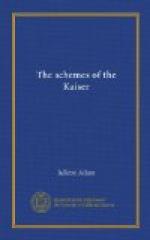“It is for me now to give thee a name. Thou shalt carry that which my Castle bears, whose towers rise so high towards Heaven, that which, lying amidst the beautiful country of Suabia, has given its name to my family. It is a name which recalls to my Fatherland centuries full of labour, of work done with and for the people, of life devoted to the people, of good examples set in leading the people in paths of literature and in many struggles. The name which thou shall bear means all this. Mayest thou do honour to thy name, and to thy flag, to the great Elector who, first of all men, taught us our Mission on the sea, and to my great ancestors who, by works of peace as in fierce warfare, knew how to keep and increase the glory of our fatherland. I baptize thee Hohenzollern!”
August 29, 1892. [26]
William II, claiming as usual to be ahead of every change of opinion in Europe, and to direct it, has chosen a very singular pretext to make profession of his faith as a pacifist, at the moment when Lord Rosebery was doing the same, and when the visit of our squadron to Genoa was about to emphasise a relaxation of tension in the relations between France and Italy.
On June 24, 1890, the following motion was adopted by the Reichstag—
“The Governments of the Confederated German States are requested to take into serious consideration the introduction of the two years’ period of military service for the Infantry.”
Without deigning to remember this, and without bothering his head as to the discomfiture of the peasantry, who believed the Emperor to be really favourable to a scheme which he had openly patronised hardly six months before, on the ground that he had been greatly impressed by General Falkenstein’s report; indifferent also to the difficulty of the situation in which he was placing Von Caprivi, advocate of the two years’ system—the Emperor-King (apparently just because on that day it had pleased him to make a declaration in favour of peace) made a speech to his officers after the last review of the Guards, and summarily condemned any reduction in the term of military service. Moreover, he requested his hearers to repeat his words and to let people know the motives which impelled him thus to set his face against a reform, which, not having secured his approval, must remain in the limbo of fantastic schemes.
Much stir and commotion follows, and as usual a great deal is said about the most changeable and the most feather-headed of Sovereigns; then we have a new interpretation of his speech by the Press, contradictions of the original text, withdrawal by the Emperor himself of his original words, and finally, as net result: a great deal of noise, and the attention of all Europe directed towards William II. What more could he ask?
Soon, thanks to the insidious activities of Austria in Servia, and thanks to that of his own police on the Franco-Belgian frontier, William will be able to threaten Europe with War.




